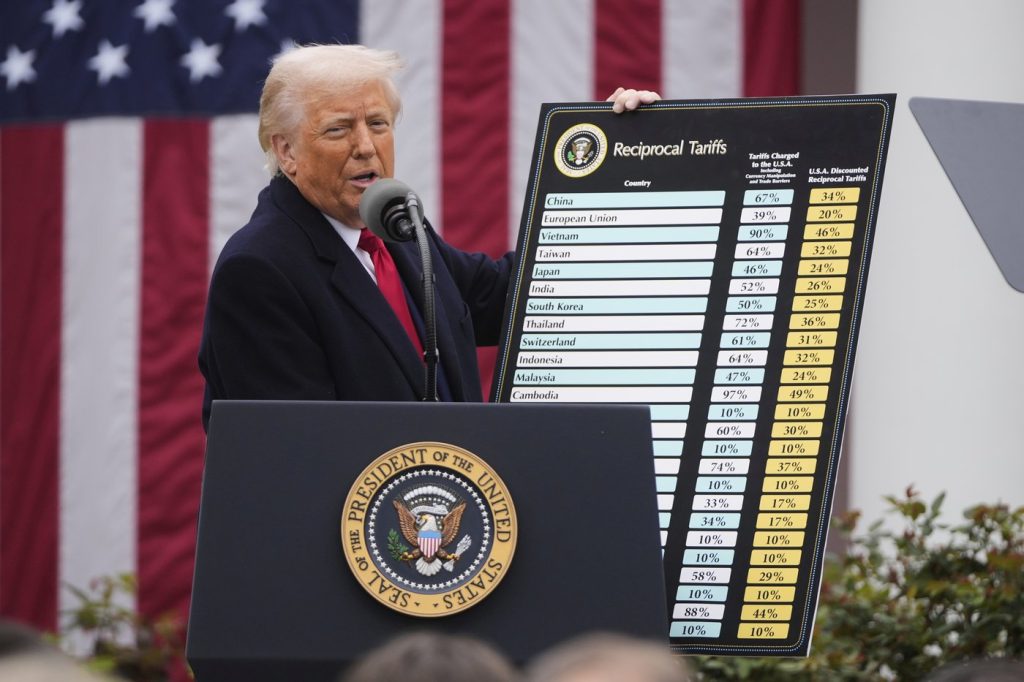A federal appeals court in the United States has ruled that President Donald Trump’s global tariffs will remain in effect while a significant legal case is underway. This decision follows an emergency stay that was previously issued after a lower court deemed the tariffs unlawful. The U.S. Court of Appeals for the Federal Circuit stated, "a stay is warranted under the circumstances," marking a temporary victory for the Trump administration amid its ongoing efforts to reorganize global trade.
White House spokesman Kush Desai characterized the court's decision as a validation of the administration’s actions, asserting, “The Trump administration is legally using the powers granted to the executive branch by the Constitution and Congress to address our country’s national emergencies of persistent goods trade deficits and drug trafficking.” Desai further expressed optimism about the ultimate outcome of the case and welcomed the appeals court's ruling.
In May, the U.S. Court of International Trade ruled that President Trump lacks the authority to impose tariffs on nearly every country under the International Economic Emergency Powers Act (IEEPA) of 1977. This national security statute allows the president to manage economic transactions following the declaration of an emergency. The New York-based federal court concluded in its three-judge panel decision that any interpretation of IEEPA that grants unlimited tariff authority is unconstitutional. Consequently, it issued a nationwide injunction against further imposition of the tariffs.
In response to the ruling, the Trump administration quickly sought an emergency motion that effectively froze the trade court’s decision, which challenged the so-called “Liberation Day” and fentanyl-related tariffs. The appeals court upheld the stay but emphasized the need for expedited hearings, stating, “these cases present issues of exceptional importance warranting expedited en banc consideration.” A proposed schedule suggests legal arguments will commence by July 31, indicating that the affected countries will continue to face the imposed tariffs for the time being.
Legal experts like George Mason University law professor Ilya Somin criticized the appeals court's decision as "unfortunate." Somin is representing five American small businesses contesting the tariffs. He noted that although the court’s decision was not a judgment on the merits, the expedited schedule suggests a serious examination of the case's legal implications. Somin confidently stated that he remains optimistic about the appellate court's eventual ruling regarding the president's extensive claims of tariff authority.
The introduction of the tariffs has led to significant market fluctuations and disruptions in supply chains, as President Trump has leveraged unprecedented executive powers. Historically, the IEEPA had not been employed by a U.S. president to enforce tariffs before Trump’s administration. In March, the president implemented economy-wide duties on Canada following an emergency declaration regarding fentanyl flow at the northern border, although he later partially paused these tariffs for imports compliant with the Canada-U.S.-Mexico Agreement (CUSMA).
Subsequently, in April, Trump expanded his trade war, imposing tariffs on nearly all countries, framing the trade deficits as a national emergency. Although he later relaxed some of the harsher tariffs, a 10 percent universal tariff remains intact for the majority of nations. He has suggested that if countries fail to negotiate favorable terms, he reserves the right to set tariffs unilaterally.
White House Press Secretary Karoline Leavitt has vocalized the administration's stance that the Supreme Court should intervene to end what she termed "judicial overreach" exhibited by the lower court’s ruling. The appeal is focusing on two separate cases against Trump's tariffs: one initiated by five American small businesses and another involving 12 states contesting both the “Liberation Day” duties and the fentanyl-related tariffs.
At least seven separate lawsuits challenge the legitimacy of the tariffs. Attorneys representing the businesses argue that the IEEPA does not explicitly authorize tariffs and maintain that the U.S. Constitution allocates tariff and tax powers to Congress, suggesting that Trump has misapplied the statutory authority. Similarly, attorneys representing the states contend that the tariffs result in an unpredictable trade policy influenced by presidential decisions, impacting American businesses adversely.
A group of 33 senators submitted an amicus brief, highlighting that the tariffs threaten the viability of small and medium-sized businesses and usurp legislative powers designated for Congress. They emphasized that many businesses lack the financial means to absorb increased tariff costs and struggle to adjust supply chains swiftly. The delays from tariff implementations, even those lasting only a few weeks, could lead to severe economic harm, including layoffs and potential bankruptcies.
In addition to the global tariffs, Canada continues to face duties on steel, aluminum, and automobiles, which were enacted through different powers under the Trade Expansion Act of 1962. As the legal battles regarding these tariffs unfold, their implications on domestic and international trade remain significant and closely monitored.












